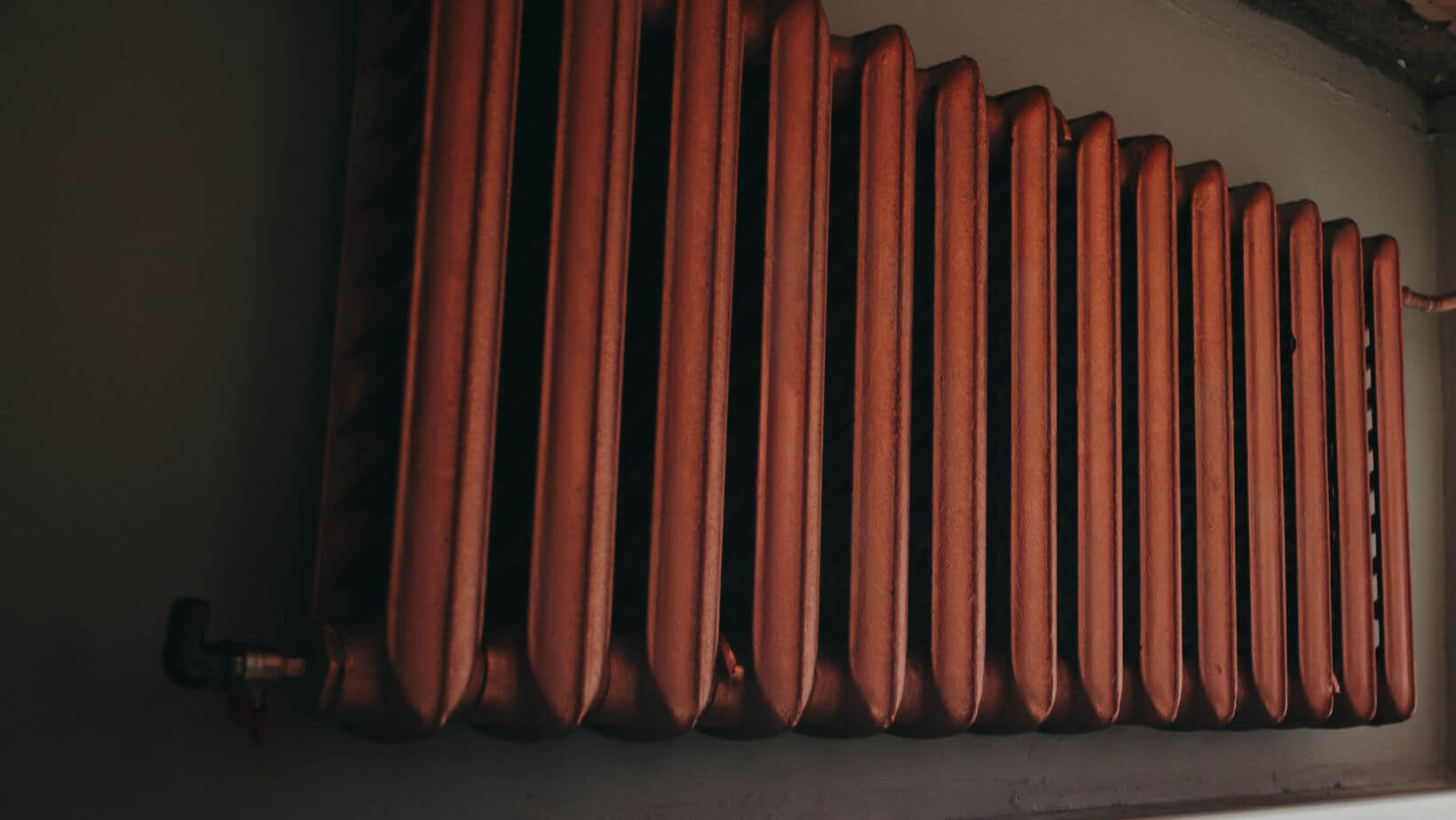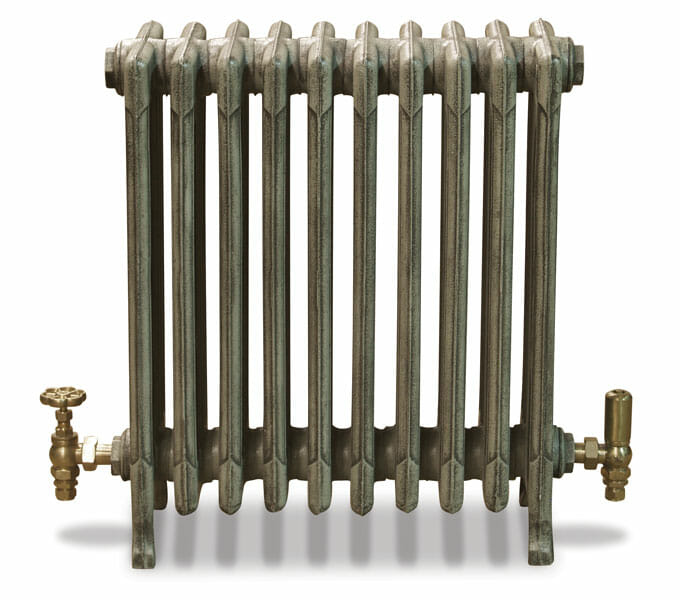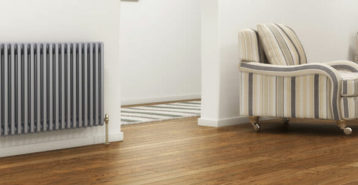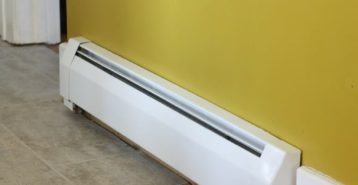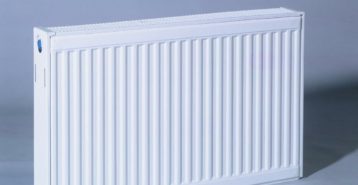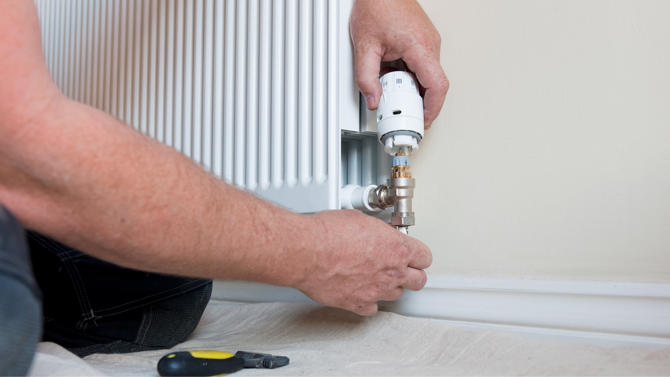What Are Cast-Iron Radiators?
Cast-iron radiators are among the oldest heating fixtures still in use. These finned units work with either steam from a boiler or hot water from a hydronic system. As steam or hot water moves through the radiator, the metal releases heat into the surrounding air for steady, room-wide comfort.
Cast-Iron Radiator Costs
HVAC pricing varies by size, style, brand, and whether the unit is new or refurbished.
| Item | Typical Cost | Notes |
|---|---|---|
| Installation (per project) | $500 to $3,000 | Includes basic setup; complex retrofits cost more. |
| Small Radiator | $200 to $500 (Two to Four Columns) | Entry-level sizes for smaller rooms. |
| Medium-Sized Radiator | $400 to $800 (Four to Six Columns) | Popular balance of output and footprint. |
| Large Radiator | $800 to $1,500 (Six to Ten Columns) | Higher output for larger spaces. |
| Refurbished Radiator | $200 to $1,000 | Price varies by size, style, and condition. |
| Labor | $6.08 to $11.17 per hour | Rates vary by market and scope. |
| Accessories & Materials | Varies | Valves, brackets, feet, air vents, and trim. |
| Custom Finishes/Design | Varies | Decorative finishes and special sizes add cost. |
Custom sizes and decorative finishes are available for a period-correct look. Ask your contractor if they offer design options that fit your home.
What Affects Cast-Iron Radiator Costs
A few factors have the biggest impact on your total investment.
- Unit Size and Heat Output: Larger, higher-output radiators cost more.
- New vs. Refurbished: Refurbished units can save money but may need extra prep.
- Style and Finish: Ornate designs and specialty finishes raise the price.
- Custom Dimensions: Non-standard sizes or made-to-order pieces add lead time and cost.
- Installation Complexity: Re-piping, moving locations, or reinforcing floors increases labor.
- Local Labor Rates: Market rates, union labor, and seasonal demand affect pricing.
- System Type and Condition: Steam vs. hot water requirements, plus valve and control upgrades.
- Accessories and Controls: Thermostatic valves, brackets, feet, and trim pieces add up.
- Refurbishing Work (If Applicable): Sandblasting, pressure testing, and repainting.
- Delivery and Handling: Heavy units can require special shipping and on-site equipment.
- Disposal of Old Equipment: Haul-away fees for existing radiators or piping.
Why Homeowners Choose Cast Iron
Cast iron has a few standout advantages. If you like classic style and even, lasting warmth, these may be a good fit.
- Long-Lasting, Even Heat: Cast iron warms up and cools down slowly, which helps reduce hot and cold swings. Once heated, the radiator continues producing gentle warmth — a cozy, consistent feel throughout the room.
- Highly Durable: These radiators are solid and tough. They resist dents better than many lighter options. Surface rust can usually be sanded and refinished, extending the radiator’s life and appearance.
- Reliable: With few moving parts, cast-iron radiators are known for long service life. As long as valves and system components are maintained, the radiator itself can outlast many modern heating appliances.
- Quieter Operation: Steam systems can hiss or knock, but cast iron expands and contracts less than lighter metals, which helps cut down on common system noises.
- An Elegant, Timeless Look: Many cast-iron radiators feature ornate details and classic brass valves. In older homes, they preserve historic character — a big plus if you value charm and authenticity.
Considerations Before You Buy a Cast Iron Radiator
A few practical points can help you decide if cast iron is the right radiator heating type for your space.
- Size and Weight: Cast-iron radiators are heavy and typically floor-mounted rather than wall-hung. They take up floor space, so they may not suit smaller rooms. If space is tight, consider slim flat-panel radiators or lighter steel or aluminum options.
- Safety and Anchoring: Every radiator should be installed securely. Your contractor should anchor the unit into wall studs or use sturdy floor mounts so it sits level, resists tipping, and operates safely.
- Sizing and Installation Tips: Getting the size right is essential for comfort and efficiency. A licensed plumber or heating specialist can calculate the correct output for your room’s square footage, insulation, window count, and climate. If you are replacing a unit, the existing radiator size is a helpful starting point, but a professional load calculation will confirm the best fit.
Looking for Another Type of Radiator?
We’ve got you covered. Check out our info guides:
- Radiator Installation, Repair, and Maintenance
- Column Radiator Heating
- Baseboard Radiator Buying Guide
- What Are Panel Radiators?
Bottom Line on Cast Iron Radiators
A properly sized, well-installed cast-iron radiator can be a comfortable way to heat a room. While not the most compact or modern option, it offers durable construction, reliable performance, quiet operation, and enduring style — warmth you can feel and a look you can love for decades.
Compare top-rated HVAC pros in your area.
Read real homeowner reviews, explore qualifications, and view promotions. Modernize makes it easy to browse professionals and find one that will be perfect for your project.
